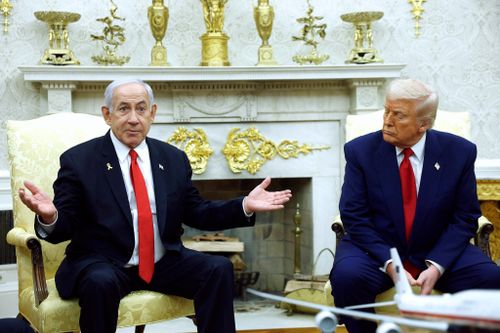Israel Called Off Iran Strikes After Trump Intervened: Report


Mr. Trump made his decision after months of internal debate over whether to pursue diplomacy or support Israel in seeking to set back Iran’s ability to build a bomb, at a time when Iran has been weakened militarily and economically. The debate highlighted fault lines between historically hawkish American cabinet officials and other aides more skeptical that a military assault on Iran could destroy the country’s nuclear ambitions and avoid a larger war. It resulted in a rough consensus, for now, against military action, with Iran signaling a willingness to negotiate.

U.S. President Donald Trump blocked a planned Israeli strike on Iranian nuclear sites in favor of negotiating a deal with Iran to limit its nuclear program, the New York Times reported on Wednesday, citing administration officials and others. Israel had developed plans to attack the sites in May, according to the newspaper, which added that the goal was to set back Iran's ability to develop a nuclear weapon by a year or more. The New York Times said U.S. assistance was required not just to defend Israel from Iranian retaliation but also ensure the attack was successful. After months of internal debate, Trump made the decision to seek negotiations with Iran rather than support military action.
The decision followed months of internal U.S. debate about whether to back Israel's plan, which aimed to delay Iran's nuclear progress by at least a year. Israeli officials had developed detailed proposals, but most would have required American involvement, including the use of U.S. aircraft and defenses to ensure success and protect Israel from retaliation. While some U.S. officials, including Gen. Michael E. Kurilla and national security adviser Michael Waltz, were open to supporting Israel militarily, others expressed concern. Director of National Intelligence Tulsi Gabbard warned that a U.S. military buildup could escalate into a broader war.













20h ago — U.S. Rep. Mark Harris | We need to rein in the Johnson Amendment and its silencing of religious leaders
 WORLD
WORLD
20h ago — The Naval Academy's removal of nearly 400 books on diversity and inclusion reveals a troubling pattern of censorship that could spread to public schools and universities nationwide.
 Penn Live
Penn Live
20h ago — If you're tired of censorship and dystopian threats against civil liberties, subscribe to Reclaim The Net. Gab, a US-based social media platform know
 ussanews.com
ussanews.com
20h ago — Google has been found guilty of antitrust violations in the publisher ad server and ad exchange markets, marking the second time the tech giant has been ruled a monopolist within a year. Google is expected to appeal the verdict, and the split nature of the decision means a forced breakup action is unlikely.
 Breitbart
Breitbart20h ago — Government officials improperly shared sensitive documents with thousands of federal workers, according to internal records...
 Newsmax
Newsmax